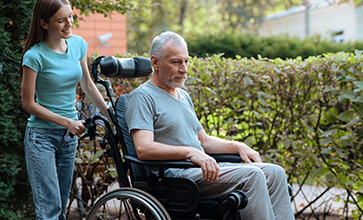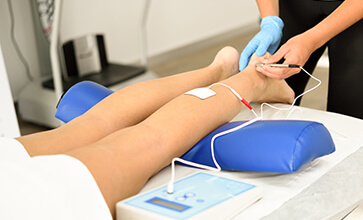Services
01. Services
Everyone Deserves Our
Best Services

Assisted Living
This type of care is for seniors who need help with activities of daily living (ADLs) such as bathing, dressing, and grooming.

Personal Care
Personal care services are often offered to seniors who need help with ADLs but do not need the level of medical care provided.

Nursing Care
This type of care is for seniors who need more intensive medical care, such as intravenous therapy or rehabilitation after a hospital stay.

Rehabilitation
Rehabilitation services are physical therapy, occupational therapy, and speech therapy, to help seniors recover from an injury or illness.

Home Care
Some senior care centers offer in-home care services, which allow seniors to receive care in the comfort of their own homes.

Memory care
This type of care is specifically designed for seniors with Alzheimer's disease or other forms of dementia.



78%
Success Rate
Book an
Appointment Today!
If you or a loved one is in need of assisted living, memory care, skilled nursing, or rehabilitation services, we encourage you to book an appointment today. Our team of experienced and compassionate caregivers is here to help you find the care that's right for you.
Get Appointment02. FAQ
Frequently Asked
Questions
Our goal each day is to ensure that our residents’ needs are not only met but exceeded. To make that happen we are committed to providing an environment in which residents can enjoy a wide range of amenities that allow them to feel independent safe and secure all while having fun!
Is there support for me at home?
Yes, Oberlin senior care centers offer home care services to seniors who wish to remain in their own homes but need assistance with activities of daily living (ADLs) such as bathing, dressing, and grooming, or with tasks such as medication management and transportation. Home care services may be provided by trained caregivers or nursing assistants, and may be paid for out-of-pocket, through private insurance, or through a public program such as Medicaid.
I am worried about a loved one
It can be difficult and stressful to worry about a loved one, especially if they are experiencing health challenges or are in need of additional support. If you are concerned about a loved one, there are a few steps you can take to help them and alleviate your own worries:
- Communicate openly with your loved one about your concerns and listen to their perspective.
- Gather information about senior care options and resources, such as assisted living facilities, home care services, and local support groups.
- Consider seeking the help of a geriatric care manager or social worker, who can assess your loved one's needs and help you develop a care plan.
- Talk to your loved one's healthcare provider about your concerns and ask for their advice on how to best support your loved one.
- Take care of yourself and seek support for yourself if you are feeling overwhelmed. Caring for a loved one can be emotionally and physically draining, and it's important to take care of yourself in order to be able to provide the best care possible.
How can I manage my breathlessness?
Breathlessness, or dyspnea, is a common symptom that can be caused by a variety of conditions, including asthma, chronic obstructive pulmonary disease (COPD), heart failure, and anemia. If you are experiencing breathlessness, it's important to speak with your healthcare provider to determine the cause and receive appropriate treatment. In the meantime, there are a few strategies you can try to manage your breathlessness:
- Practice deep breathing exercises: Take slow, deep breaths in through your nose and out through your mouth. This can help to improve your breathing and reduce feelings of breathlessness.
- Use good posture: Stand up straight and avoid leaning forward. Good posture can help to improve your breathing and reduce feelings of breathlessness.
- Stay hydrated: Drink plenty of fluids, especially water, to help thin mucus and make it easier to breathe.
- Avoid triggers: If you know what triggers your breathlessness (such as cold air, dust, or tobacco smoke), try to avoid these triggers as much as possible.
- Use assistive devices: If you have been prescribed oxygen therapy or a nebulizer, use these devices as directed to help improve your breathing.
I need help managing my pain
Chronic pain can be a challenging condition to manage, but there are a number of strategies and treatments that can help to reduce pain and improve quality of life. It's important to speak with your healthcare provider about your pain and work together to develop a pain management plan that is tailored to your needs. Some strategies for managing pain include:
- Medication: Over-the-counter pain relievers such as acetaminophen (Tylenol) or nonsteroidal anti-inflammatory drugs (NSAIDs) such as ibuprofen (Advil) can be helpful for managing mild to moderate pain. Your healthcare provider may also prescribe stronger pain medications if needed.
- Physical therapy: Exercise and other physical therapies can help to improve strength, flexibility, and mobility, which can in turn reduce pain.
- Heat and cold therapy: Applying heat or cold to the affected area can help to reduce pain and inflammation.
- Complementary therapies: Strategies such as acupuncture, massage, and relaxation techniques can be helpful for managing pain.
- Lifestyle changes: Making changes to your diet, sleep habits, and stress management techniques can help to reduce pain and improve overall health.
